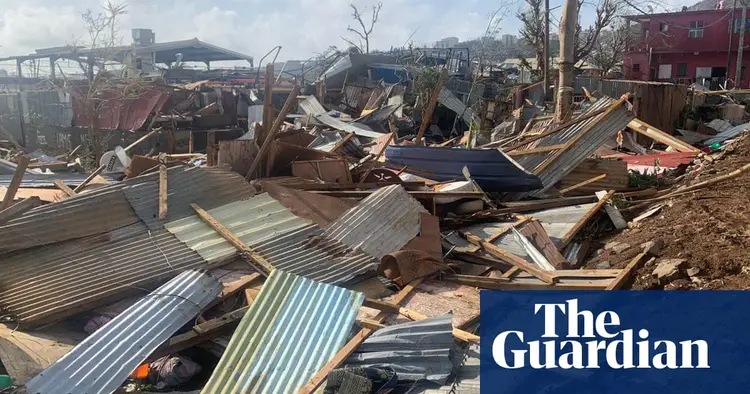Hundreds feared dead as Cyclone Chido devastates French island of Mayotte

Authorities estimate that hundreds of people may have lost their lives following the most devastating cyclone to hit Mayotte in nearly a hundred years. This powerful storm struck the French Indian Ocean territory on Saturday, causing significant damage by uprooting trees, destroying homes, and severely impacting the fragile infrastructure of the struggling archipelago.
Rescue teams have been sent to the islands situated between the shores of Mozambique and Madagascar. However, their work may be complicated by the destruction of airports and power infrastructure in a region that already struggles with consistent access to clean drinking water.
In an interview with Mayotte’s la 1ere TV station on Sunday, François-Xavier Bieuville, the prefect of the archipelago, stated that the current death count of 11 is expected to rise significantly in the days ahead.
"I believe there will definitely be several hundred, and we might even hit a thousand or more."
Bieuville mentioned that determining a final number would be quite challenging since the majority of the residents are Muslim, and they typically bury their deceased within a day.
The mayor of Mamoudzou, the capital of Mayotte, Ambdilwahedou Soumaila, informed Agence France-Presse that nine individuals sustained severe injuries during Cyclone Chido and are currently battling for their lives in the hospital. Additionally, 246 others suffered significant injuries.
"The hospital has been affected, the schools have suffered damage, and homes have been completely destroyed," he noted, emphasizing that the cyclone had left no one untouched.
A local named Ibrahim shared with AFP that he encountered “apocalyptic scenes” while navigating the main island, having to clear the blocked streets on his own.
The 320,000 people living in Mayotte were ordered to stay indoors on Saturday as Cyclone Chido approached the islands, with wind speeds reaching at least 226 kilometers per hour (140 miles per hour).
Drone videos released by the French gendarmerie revealed the destruction of numerous temporary homes scattered across the hills of one of Mayotte's islands. These areas have become a central hub for illegal immigration from the nearby Comoros islands.
According to his office, France's interior minister, Bruno Retailleau, is set to visit Mayotte on Monday. He will be accompanied by 160 soldiers and firefighters, adding to the 110 personnel already stationed in the islands.
Officials in Réunion, a French territory in the Indian Ocean located approximately 1,400 kilometers across from Madagascar, announced that medical staff and supplies were being transported by both air and sea.
A humanitarian airplane arrived in Mayotte around 3:30 PM local time on Sunday, delivering three tons of medical supplies and blood for transfusions, along with a team of 17 medical professionals. Two military planes were anticipated to arrive afterward.
A naval patrol vessel was set to leave Réunion carrying both personnel and supplies, including resources for the electricity provider EDF.
Patrice Latron, the prefect of Réunion, announced that officials plan to set up an air and sea connection to Mayotte. In the next few days, an additional 800 rescue operatives will be dispatched, and over 80 tons of supplies have already been delivered by air or are en route by ship. He highlighted that key priorities include restoring power and ensuring access to clean drinking water.
Mayotte is the least wealthy island in France and the most impoverished area within the EU. In certain regions, whole communities of metal shacks and small homes were destroyed, and locals have noted that numerous trees were toppled, boats were overturned or sunk, and the power supply was disrupted.
Chido also struck the nearby islands of Comoros and Madagascar. Officials in Comoros reported that 11 fishermen who had set out to sea earlier this week are unaccounted for. The powerful tropical cyclone, which hit Mozambique on Sunday, is expected to impact about 2.5 million people in the northern region of the country, with aid organizations cautioning that there may be additional casualties and significant destruction.
A representative from Unicef verified that Cabo Delgado, the northernmost province of Mozambique, which has a population of around 2 million, has been affected. Many homes, schools, and healthcare facilities in the area have suffered partial or total destruction.
The cyclone season in this area lasts from December to March, during which the south-eastern Indian Ocean and southern Africa have experienced a number of severe storms in recent years. In 2019, Cyclone Idai took the lives of over 1,300 individuals in Mozambique, Malawi, and Zimbabwe. Last year, Cyclone Freddy resulted in more than 1,000 deaths across multiple nations.
Cyclones can lead to flooding and landslides, as well as create still bodies of water that could later result in severe outbreaks of diseases like cholera, dengue fever, and malaria.
Research indicates that cyclones are intensifying due to the climate crisis. These severe weather events can lead to significant humanitarian challenges in impoverished nations in southern Africa, which contribute only a small fraction to global warming. This highlights their urgent plea for increased assistance from wealthier countries to manage the effects of climate change.
This report includes contributions from the Associated Press and Agence France-Presse.













































